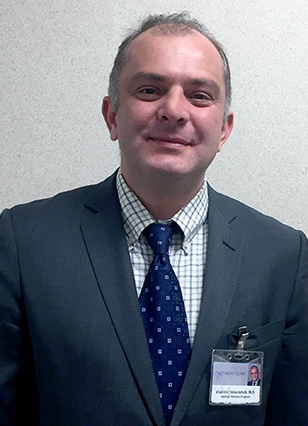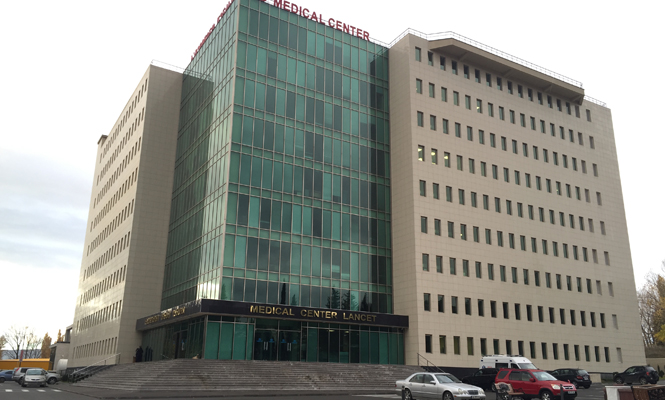Lado Tsikarishvili, MD, is a senior neurosurgeon consultant at M. Iashvili Children’s Hospital and is head of the neurosurgery department at Medical Center Lancet in Tbilisi, Georgia. For the December 2015 issue of AANS Neurosurgeon, Jamie Van Gompel, MD, interviewed him for his perspective on the challenges neurosurgeons face in Georgia, his practice, the types of cases he works on and the differences between neurosurgery in Georgia and the U.S. We thank them both for sharing it with us.

Jamie Van Gompel (JVG): Please describe your training and overall experience as a neurosurgeon. When did you know you wanted to become a neurosurgeon?
Lado Tsikarishvili (LT): I always had an interest and am impressed by anatomy. Georgia was in the midst of a civil war when I was a young man, and I did not have any real possibilities for a medical education. So after graduating from medical university, I traveled to Moscow to the Burdenko Neurosurgery Institute and completed my residency. I have always tried to improve my medical skills, so I also completed numerous fellowships in Germany, England and Italy.
JVG: Please describe your practice.
LT: During the past five years, I have operated on more than 200 aneurysms — most of them in the acute state — more than 50 cases on complex skull base tumors, more than 30 deep-seated tumors or vascular malformations, about 30 microvascular decompressions (trigeminal neuralgia), two cases of glossopharyngeal neuralgia, about 15 endoscopic transsphenoidal removal of skull base tumors (pituitary adenomas and chordomas) and about 10 endoscopic third ventriculostomies.
JVG: How many neurosurgeons are in Georgia?
LT: There are 10 to 50 practicing neurosurgeons in Georgia, which has a population of roughly five million people. Though there are a small number of neurosurgeons in Georgia, most of the neurosurgeons are not working together, and thus, neurosurgery practices are mainly comprised of private practices with general practice principles.
JVG: How many cases would a busy neurosurgeon in Georgia complete per year?
LT: Approximately 200 to 300 cases per year are done by each surgeon. Each individual neurosurgeon is responsible for every portion of the procedure. It is challenging to find sufficient, sub-specialized neurosurgeons in the area. Generally, there are no big groups, only private practices, which can be challenging from a patient care standpoint.
JVG: What is the biggest challenge to neurosurgery in Georgia?
LT: There is generally good instrumentation and facilities, but there is a lack of teamwork overall. There are very good individual neurosurgeons, but the facilities do not have good universal teamwork. Fellow neurosurgeons generally do not help each other identify disease problems, etc., and they do not help each other take care of patients.
JVG: How do patients pay for surgery in Georgia?
LT: In the Republic of Georgia, the government will pay a majority of the costs. However, patients are responsible for a percentage of the medical bill, which could be up to 20 percent.
JVG: What is the biggest difference between neurosurgery in Georgia and in the U.S.?
LT: Neurosurgeons are responsible for every portion of the procedure in Georgia. However, because they are working on so many different cases, it is difficult to collect one type of case. There is no way to share my experiences with my fellow colleagues about neurosurgery and results are not as good because I am doing every type of case. There is not as much sub-specialty within neurosurgery in Georgia, and there are no opportunities to pursue neurosurgical research or to control my case load. Furthermore, we typically do not perform functional neurosurgery to treat movement disorders and complex epilepsy cases. Additionally, we do not have experience in modern intraoperative neurophysiological monitoring and are currently looking to couple with American institutions to enhance these capabilities.
JVG: What is your favorite type of case to do?
LT: In general, I enjoy performing neurovascular surgeries (especially aneurysmal operations), skull-base procedures and epilepsy surgery.
JVG: And your least favorite type?
LT: One case comes to mind. I had to perform a giant aneurysmal procedure on a child. It was an incredibly difficult case due to the lack of sub-specialization. The pediatric cases are unique and therefore, more difficult.
JVG: What’s one thing you could improve upon in neurosurgery in Georgia?
LT: Primarily, I would like to improve the quality of treatments in Georgia. There are high complication rates because of organization problems. I would like to improve the organization of neurosurgery overall so we can become more sub-specialized and thus, improve patient care.
JVG: Is there any surgical procedure you perform that the U.S. does not?
LT: There is nothing that Georgia performs that the U.S. does not.
JVG: What is your favorite thing about Georgia?
LT: All of my friends live there, and the country is beautiful.
[aans_authors]








